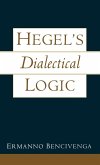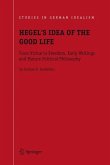Dean Moyar
Hegel's Conscience
Dean Moyar
Hegel's Conscience
- Broschiertes Buch
- Merkliste
- Auf die Merkliste
- Bewerten Bewerten
- Teilen
- Produkt teilen
- Produkterinnerung
- Produkterinnerung
This book provides a new interpretation of the ethical theory of G.W.F. Hegel. The aim is not only to give a new interpretation for specialists in German Idealism, but also to provide an analysis that makes Hegel's ethics accessible for all scholars working in ethical and political philosophy.
Andere Kunden interessierten sich auch für
![Hegel's Dialectical Logic Hegel's Dialectical Logic]() Ermanno BencivengaHegel's Dialectical Logic123,99 €
Ermanno BencivengaHegel's Dialectical Logic123,99 €![Hegel's Ethical Thought Hegel's Ethical Thought]() Allen W. WoodHegel's Ethical Thought36,99 €
Allen W. WoodHegel's Ethical Thought36,99 €![Hegel's Idea of the Good Life Hegel's Idea of the Good Life]() Joshua D. GoldsteinHegel's Idea of the Good Life76,99 €
Joshua D. GoldsteinHegel's Idea of the Good Life76,99 €![Hegel's Value Hegel's Value]() Dean MoyarHegel's Value132,99 €
Dean MoyarHegel's Value132,99 €![Conscience Conscience]() Paul StrohmConscience16,99 €
Paul StrohmConscience16,99 €![Algebra of Conscience Algebra of Conscience]() V. A. LefebvreAlgebra of Conscience168,99 €
V. A. LefebvreAlgebra of Conscience168,99 €![Birth Control and the Catholic Conscience Birth Control and the Catholic Conscience]() Philip St. RomainBirth Control and the Catholic Conscience10,99 €
Philip St. RomainBirth Control and the Catholic Conscience10,99 €-
-
-
This book provides a new interpretation of the ethical theory of G.W.F. Hegel. The aim is not only to give a new interpretation for specialists in German Idealism, but also to provide an analysis that makes Hegel's ethics accessible for all scholars working in ethical and political philosophy.
Produktdetails
- Produktdetails
- Verlag: Oxford University Press
- Seitenzahl: 234
- Erscheinungstermin: 1. April 2014
- Englisch
- Abmessung: 234mm x 156mm x 14mm
- Gewicht: 405g
- ISBN-13: 9780199371556
- ISBN-10: 0199371555
- Artikelnr.: 40137732
- Herstellerkennzeichnung
- Libri GmbH
- Europaallee 1
- 36244 Bad Hersfeld
- gpsr@libri.de
- Verlag: Oxford University Press
- Seitenzahl: 234
- Erscheinungstermin: 1. April 2014
- Englisch
- Abmessung: 234mm x 156mm x 14mm
- Gewicht: 405g
- ISBN-13: 9780199371556
- ISBN-10: 0199371555
- Artikelnr.: 40137732
- Herstellerkennzeichnung
- Libri GmbH
- Europaallee 1
- 36244 Bad Hersfeld
- gpsr@libri.de
Dean Moyar is Associate Professor in the Department of Philosophy at Johns Hopkins University. He works on Kant and German Idealism, practical reason, and the philosophical foundations of liberalism. He is the editor of the Routledge Companion to Nineteenth Century Philosophy (2010) and is currently editing The Oxford Handbook of Hegel. He was a 2012 fellow at the American Academy in Berlin and in 2013 he was awarded a Humboldt Fellowship to work on a book on Hegel's political philosophy.
Acknowledgments
Note on Citations and Abbreviations
Introduction
1. Hegelian Ethics?
2. Interpretive Parameters
3. Hegel's Problem
1: Self-Consciousness and Agency
1.1. First-Person Authority and Responsible Action
1.2. Conscience in History
1.3. Immanent Negativity
1.4. Negativity and Ethical Content
1.5. A Performative View of Practical Reason
2: Motivating and Justifying Reasons
2.1. The Reasons Identity Condition
2.2. Internal Reasons and the Knight of Virtue
2.3. The Implicit Universality and Objectivity of Internal Reason
2.4. Freedom and the Appeal to Pure Reason
2.5. Conscience and Motivating Reasons
2.6. The Ambiguity of Conscience
2.7. The Complex Reasons Identity Condition
3: Holism and Detachment
3.1. Subjectivism and Detachment
3.2. Self-Expression and Interpretive Authority
3.3. Conscience as Holistic Practical Reason
3.4. Abuses of Holism
3.5. Autonomy as Non-Detachment
4: Deliberation and Justification
4.1. Moral Conflict
4.2. Law and Value
4.3. Moral Reflection and Skepticism
4.4. Conscience as Judgment
4.5. Fallibilism and the Externality of Judgment
4.6. The Disjunctive Inference
5: Mutual Recognition
5.1. Recognition and the Moments of Action
5.2. The Value of the Purposes of Conscience
5.3 The Language of Conscience
5.4. Ethical Purposes and the Value of Humanity
5.5. The Endpoint of Recognition in the Phenomenology
5.6. Objective Spirit and the Transition to Ethical Life
6: Practical Reason in Ethical Life
6.1. The Family
6.2. Civil Society and the Need for Conscience
6.3. The Legal System
6.4. Right, Duty and the State
6.5. Sovereignty and Deliberative Processes
6.6. Our Actuality
Bibliography
Index
Note on Citations and Abbreviations
Introduction
1. Hegelian Ethics?
2. Interpretive Parameters
3. Hegel's Problem
1: Self-Consciousness and Agency
1.1. First-Person Authority and Responsible Action
1.2. Conscience in History
1.3. Immanent Negativity
1.4. Negativity and Ethical Content
1.5. A Performative View of Practical Reason
2: Motivating and Justifying Reasons
2.1. The Reasons Identity Condition
2.2. Internal Reasons and the Knight of Virtue
2.3. The Implicit Universality and Objectivity of Internal Reason
2.4. Freedom and the Appeal to Pure Reason
2.5. Conscience and Motivating Reasons
2.6. The Ambiguity of Conscience
2.7. The Complex Reasons Identity Condition
3: Holism and Detachment
3.1. Subjectivism and Detachment
3.2. Self-Expression and Interpretive Authority
3.3. Conscience as Holistic Practical Reason
3.4. Abuses of Holism
3.5. Autonomy as Non-Detachment
4: Deliberation and Justification
4.1. Moral Conflict
4.2. Law and Value
4.3. Moral Reflection and Skepticism
4.4. Conscience as Judgment
4.5. Fallibilism and the Externality of Judgment
4.6. The Disjunctive Inference
5: Mutual Recognition
5.1. Recognition and the Moments of Action
5.2. The Value of the Purposes of Conscience
5.3 The Language of Conscience
5.4. Ethical Purposes and the Value of Humanity
5.5. The Endpoint of Recognition in the Phenomenology
5.6. Objective Spirit and the Transition to Ethical Life
6: Practical Reason in Ethical Life
6.1. The Family
6.2. Civil Society and the Need for Conscience
6.3. The Legal System
6.4. Right, Duty and the State
6.5. Sovereignty and Deliberative Processes
6.6. Our Actuality
Bibliography
Index
Acknowledgments
Note on Citations and Abbreviations
Introduction
1. Hegelian Ethics?
2. Interpretive Parameters
3. Hegel's Problem
1: Self-Consciousness and Agency
1.1. First-Person Authority and Responsible Action
1.2. Conscience in History
1.3. Immanent Negativity
1.4. Negativity and Ethical Content
1.5. A Performative View of Practical Reason
2: Motivating and Justifying Reasons
2.1. The Reasons Identity Condition
2.2. Internal Reasons and the Knight of Virtue
2.3. The Implicit Universality and Objectivity of Internal Reason
2.4. Freedom and the Appeal to Pure Reason
2.5. Conscience and Motivating Reasons
2.6. The Ambiguity of Conscience
2.7. The Complex Reasons Identity Condition
3: Holism and Detachment
3.1. Subjectivism and Detachment
3.2. Self-Expression and Interpretive Authority
3.3. Conscience as Holistic Practical Reason
3.4. Abuses of Holism
3.5. Autonomy as Non-Detachment
4: Deliberation and Justification
4.1. Moral Conflict
4.2. Law and Value
4.3. Moral Reflection and Skepticism
4.4. Conscience as Judgment
4.5. Fallibilism and the Externality of Judgment
4.6. The Disjunctive Inference
5: Mutual Recognition
5.1. Recognition and the Moments of Action
5.2. The Value of the Purposes of Conscience
5.3 The Language of Conscience
5.4. Ethical Purposes and the Value of Humanity
5.5. The Endpoint of Recognition in the Phenomenology
5.6. Objective Spirit and the Transition to Ethical Life
6: Practical Reason in Ethical Life
6.1. The Family
6.2. Civil Society and the Need for Conscience
6.3. The Legal System
6.4. Right, Duty and the State
6.5. Sovereignty and Deliberative Processes
6.6. Our Actuality
Bibliography
Index
Note on Citations and Abbreviations
Introduction
1. Hegelian Ethics?
2. Interpretive Parameters
3. Hegel's Problem
1: Self-Consciousness and Agency
1.1. First-Person Authority and Responsible Action
1.2. Conscience in History
1.3. Immanent Negativity
1.4. Negativity and Ethical Content
1.5. A Performative View of Practical Reason
2: Motivating and Justifying Reasons
2.1. The Reasons Identity Condition
2.2. Internal Reasons and the Knight of Virtue
2.3. The Implicit Universality and Objectivity of Internal Reason
2.4. Freedom and the Appeal to Pure Reason
2.5. Conscience and Motivating Reasons
2.6. The Ambiguity of Conscience
2.7. The Complex Reasons Identity Condition
3: Holism and Detachment
3.1. Subjectivism and Detachment
3.2. Self-Expression and Interpretive Authority
3.3. Conscience as Holistic Practical Reason
3.4. Abuses of Holism
3.5. Autonomy as Non-Detachment
4: Deliberation and Justification
4.1. Moral Conflict
4.2. Law and Value
4.3. Moral Reflection and Skepticism
4.4. Conscience as Judgment
4.5. Fallibilism and the Externality of Judgment
4.6. The Disjunctive Inference
5: Mutual Recognition
5.1. Recognition and the Moments of Action
5.2. The Value of the Purposes of Conscience
5.3 The Language of Conscience
5.4. Ethical Purposes and the Value of Humanity
5.5. The Endpoint of Recognition in the Phenomenology
5.6. Objective Spirit and the Transition to Ethical Life
6: Practical Reason in Ethical Life
6.1. The Family
6.2. Civil Society and the Need for Conscience
6.3. The Legal System
6.4. Right, Duty and the State
6.5. Sovereignty and Deliberative Processes
6.6. Our Actuality
Bibliography
Index









